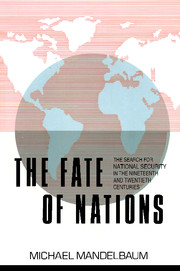Book contents
- Frontmatter
- Contents
- Acknowledgments
- A Note on Sources and Citations
- Introduction
- 1 Collective Approaches to Security: The Nineteenth-Century Managed Balance of Power System and Great Britain
- 2 France, 1919–1940: The Failure of Security Policy
- 3 The United States, 1945–1980: The Natural History of a Great Power
- 4 China, 1949–1976: The Strategies of Weakness
- 5 Israel, 1948–1979: The Hard Choices of the Security Dilemma
- 6 Collective Approaches: The International Economic Order and Japan, 1945–1985
- Index
3 - The United States, 1945–1980: The Natural History of a Great Power
Published online by Cambridge University Press: 20 May 2010
- Frontmatter
- Contents
- Acknowledgments
- A Note on Sources and Citations
- Introduction
- 1 Collective Approaches to Security: The Nineteenth-Century Managed Balance of Power System and Great Britain
- 2 France, 1919–1940: The Failure of Security Policy
- 3 The United States, 1945–1980: The Natural History of a Great Power
- 4 China, 1949–1976: The Strategies of Weakness
- 5 Israel, 1948–1979: The Hard Choices of the Security Dilemma
- 6 Collective Approaches: The International Economic Order and Japan, 1945–1985
- Index
Summary
World War II was longer, bloodier, and ranged over more of the planet than World War I. It had different consequences for one of the main determinants of the security problem, the distribution of power in the international system. In 1939 six states – Germany, France, Great Britain, Japan, the United States, and the Soviet Union – could be considered great powers; each could conduct an independent foreign policy. By 1945 only two truly retained that status, and one was far more powerful than the other, so powerful as to be in a class by itself. The United States after 1945 is the exemplar of the strong state. The pattern of its international conduct has been characteristic of such states, and its security policies have been shaped by the forces that bear on the strongest members of the international system.
America's strength was in part the result of others' weakness. Germany and Japan had been conquered and occupied. Germany was ultimately divided, and Japan was given a constitution severely limiting the military forces that it could have. France had also been defeated and was included in the victorious coalition in 1945 by the courtesy of the powers that had won the war rather than because of the contribution the Free French forces had made to its outcome. Britain's contribution had been much larger, and the British enjoyed enormous prestige for having stood alone against Hitler for a year.
- Type
- Chapter
- Information
- The Fate of NationsThe Search for National Security in the Nineteenth and Twentieth Centuries, pp. 129 - 192Publisher: Cambridge University PressPrint publication year: 1988

